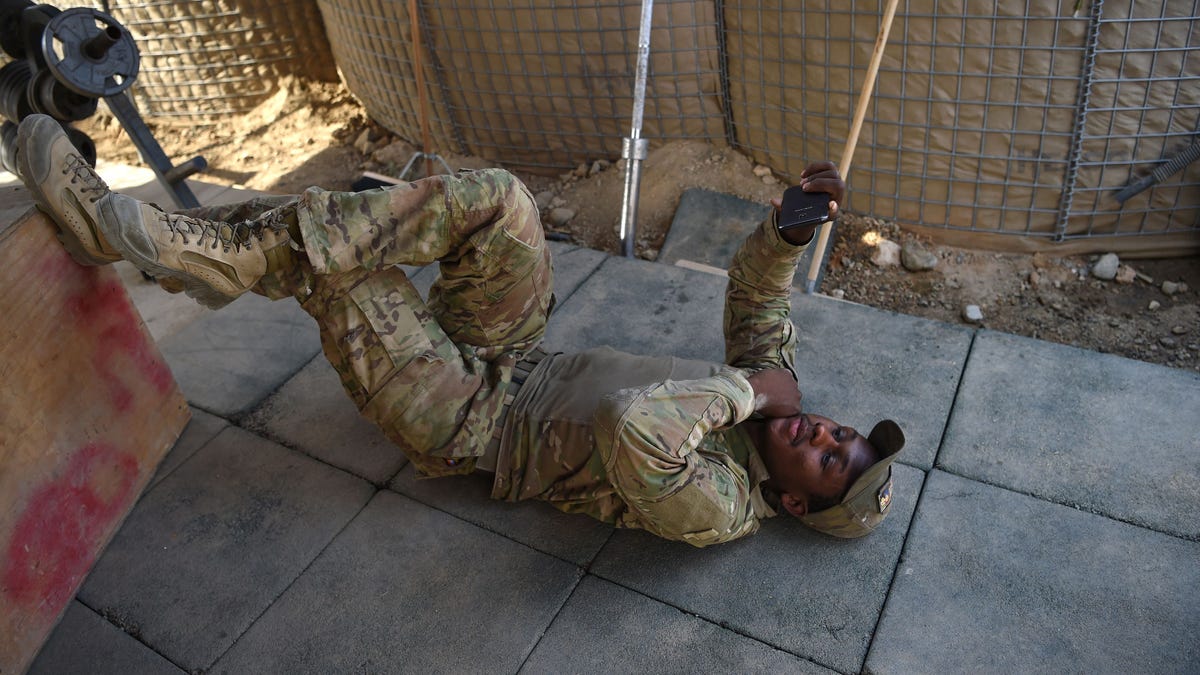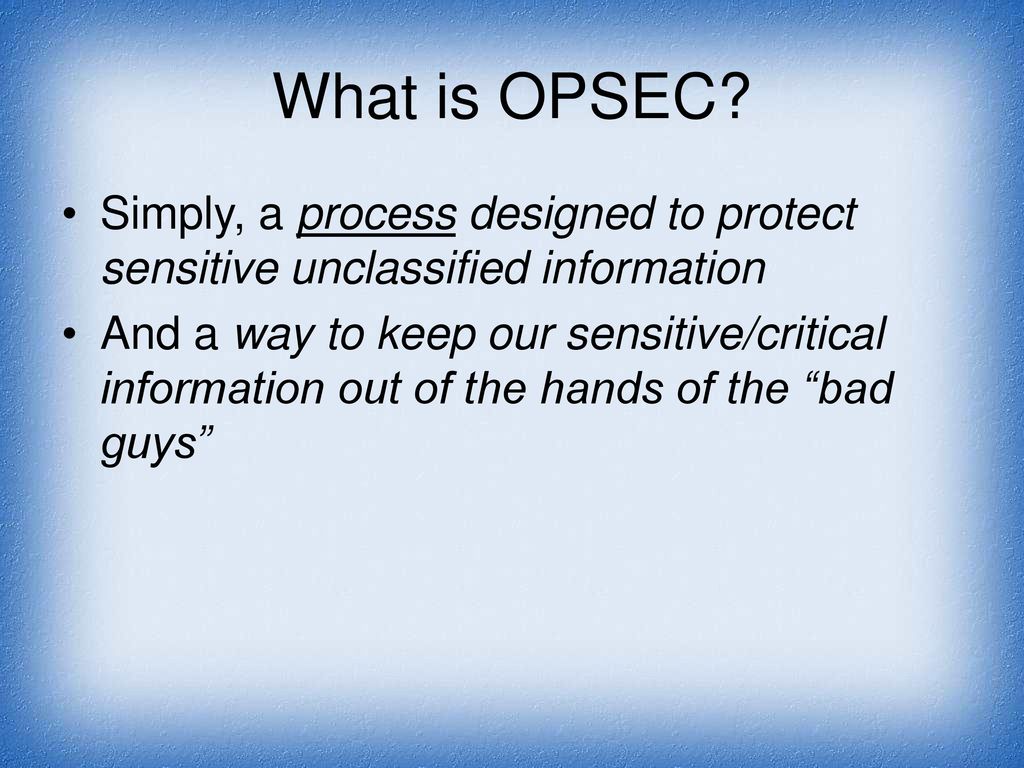Opsec Military Meaning - Operations security (OPSEC) is the process of identifying critical information to ensure that injection operations can be observed by emy intelligence, determining whether the information obtained by adversaries is useful to them, and implementing selective actions that eliminate or reduce adversary exploitation. Sharp critical information.
In a more general sse, OPSEC is the process of protecting individual data that is grouped together to provide a bigger picture (called aggregation). OPSEC is the protection of critical information deemed mission-critical by military commanders, ser leaders, management, or other decision-making bodies. This process leads to the development of countermeasures that include technical and non-technical measures such as using email encryption software, taking precautions against eavesdropping, and paying close attention to the image you have (such as objects in the background). Information on a unit, activity or organization's critical information list is not well-spoken on social media sites.
Opsec Military Meaning
Social engineering is the art of manipulating people to perform actions or reveal confidential information rather than breaking or using technical cracking techniques.
What Is Opsec (operations Security)?
OPSEC is a five-step iterative process that helps an organization identify specific information that needs protection and implement measures to protect it:
An OPSEC assessment is the formal application of a process to an existing operation or activity by a multidisciplinary team of experts. Assessments identify the need for additional OPSEC measures and necessary changes to existing ones.
In addition, OPSEC planners, working closely with public affairs personnel, must develop the Essential Elements of Freedom of Information (EEFI) needed to prevent inadvertent public disclosure of critical or sensitive information.
The term "EEFI" is being dropped in favor of "critical information" so all affected organizations use the same term, reducing confusion.
Dod Military Cut Out Stock Images & Pictures
In 1966, United States Admiral Ulysses Sharp established a multidisciplinary security team to investigate the failure of some combat operations during the Vietnam War. The operation was called Operation Purple Dragon and involved personnel from the National Security Agency and the Department of Defense.
When the mission was over, the Purple Dragon team collated their recommendations. He called the process "Operation Security" to separate the process from existing processes and ensure continued AGC support.
In 1988, President Ronald Reagan signed National Security Decision Directive (NSDD) 298. The document established the National Operations Security Program and named the Director of the National Security Agency as the executive officer for inter-AGC OPSEC support. This document establishes the Interagency OPSEC Support Staff (IOSS).

Although originally developed as a US military policy, operational security has been adopted worldwide for both military and private sector operations. In 1992, the North Atlantic Treaty Organization (NATO) added OPSEC to its glossary of terms and definitions.
Marine Corps Ready To Conduct Eabo Experiments With Allies In Indo Pacific
Military and private sector security and information organizations need OPSEC professionals. Certification is usually obtained from military or government agencies, for example: In the military, OPSEC stands for Operational Security. There are regulations and guidelines for OPSEC regarding service members and their families and friends. In this day and age of social media, there are a lot of bad guys looking for information that could hinder the security and operations of our nation's military.
OPSEC protects US operations – planned, in progress, and completed. OPSEC keeps potential adversaries from discovering critical information about the Department of Defense. A military operation must be completed quickly and successfully. Success depends on secrecy, surprise and private information. The enemy wants this critical information, and military members aren't the only ones to get it. They also see military families and friends.
Unfortunately, OPSEC cannot be summed up in a short list of rules and regulations and cover every possible situation. There are some general rules and guidelines for military family members and friends to follow.
Social Media You may want to limit your posts to friends only. Defaults on Facebook can change with no real notice and suddenly you're posting to the public. If your FRG has a Facebook group, ask the leader if it is secret, closed, or public. What you post to the group will also appear on other people's timelines.
What Is Opsec? Do's And Don'ts For Military Families
If you or your partner do not want their location reported, make sure your location services setting is turned off.
Social media is not going away now. More problems arise with social media and the consequences hit faster and faster (with less time to "correct" the mistake).
These OPSEC rules are not intended to limit your freedom of speech or limit your freedoms—the same ones our men and women in uniform fight to protect. They are in place to help ensure the safety and security of our nation's military.

4 Steps to Career Planning for Military Families 36 Rules for Life with a New Baby and a Deployed Husband 10 Airlines That Offer Military Discounts PCS'd and I Need Friends!
Dereliction Of Duty Ii: Senior Military Leaders' Loss Of Integrity Wounds Afghan War Effort By Open Briefing
My name is JD. A lot has happened in my life in a few years. I like to write about things that are important to me. I write about the daily challenges of being a working mom and military spouse. I am inspired by my family, friends and the amazing adventures I can go on.
Sign up to receive my latest and greatest articles! I promise not to misuse your inbox or sell your information. That was rude. Fort Jackson's Soldier Support Institute was awarded third place in the 2016 Operation Security Achievement Awards program announced May 13.
Geraldo Cruzado, counterterrorism officer with OPSEC and the US Soldier Support Institute, said it was a great honor for the unit to win the award with the support of the entire organization. Leaders in subordinate units ensure that they have a Level II certified OPSEC officer. Each individual must ensure that OPSEC policy and regulations are followed.
"We were a rental unit (at Fort Jackson), yet we competed against a wide range of installations" and came in third place, Cruzado said. SSI leadership takes OPSEC seriously; The success of their program depends on command support at all levels.
Information Operations (united States)
SSI Operations Officer, Chip Martin, accepted the 2016 awards, which resulted in three TRADOC-level awards for a unit, media and OPSEC officer.
In his endorsement, Martin said that in the past two years, SSI has certified more than 100 OPSEC Level II officers in the post and has spent more than $1.2 million in the past five years to improve its physical security by purchasing shredders, general access card readers. Blasters. Insulated security doors, cameras, cipher locks and security fencing.
SSI also created unit specific OPSEC Level I training while maintaining 100 percent Level II certified OPSEC officers. SSI raised awareness using multimedia, assessments, and partnerships with post OPSEC managers, while unit leadership fully supported the program. The organization's OPSEC officers regularly inspect trash and recycling bins to ensure that classified materials are properly disposed of.

Martin also wrote, "Identifying emerging OPSEC vulnerabilities, as well as determining potential compromises and applying appropriate countermeasures, is also critical to strategy."
Taking In The Trash: Deployed 'rock' Airmen Learn Meaning Of Opsec > Little Rock Air Force Base > Article Display
SSI has received many TRADOC level awards over the years. The institute won first place in the multimedia achievement category with its "Shred the Sheet" poster, was honored with second place in the organizational category, while Cruzado previously placed first and third for OPSEC officer.
Last year, Maj. Joaquin DiQuintanaro and Capt. Alicia Scott, an instructor and OPSEC officer at SSI's Adjutant General School, won first place for their "OPSEC Bandit" poster. These officers created a poster to promote OPSEC and encourage others to shred and secure sensitive information.
"Promoting operational safety is more important than the award," said the staff operations officer and retired sergeant major.
It's the best at Fort Jackson, Peters said, because of Cruzado's and SSI's emphasis on leadership.
Isec Wins Opsec Poster Contest For Second Time
"This program is distinguished by Mr. Cruzado's emphasis on OPSEC and innovation," Peters added. "He encourages his team to participate and be part of the competition with posters and articles promoting the program. I wish every OPSEC officer was as dedicated as Mr. Cruzado."
OPSEC prevents the compromise of controlled unclassified information such as personally identifiable information, personal health information, critical information, and any sensitive mission information.
"We want to prevent any adversary from getting information about our capabilities, operations, limitations or objectives (CALI, a good acronym to remember)," Cruzado said.

Military intelligence insignia meaning, military opsec training, military opsec, military challenge coin meaning, opsec awareness for military members, opsec awareness for military members dod employees and contractors, military challenge coins meaning, meaning of military ribbons, opsec meaning, military patches meaning, meaning military, military opsec rules



0 Comments